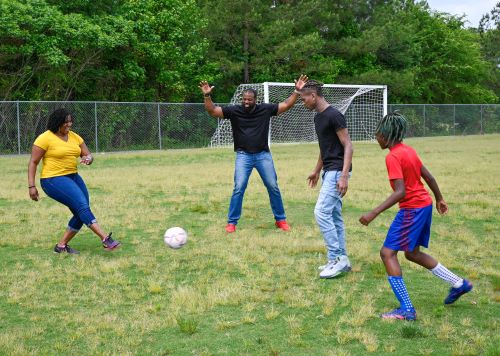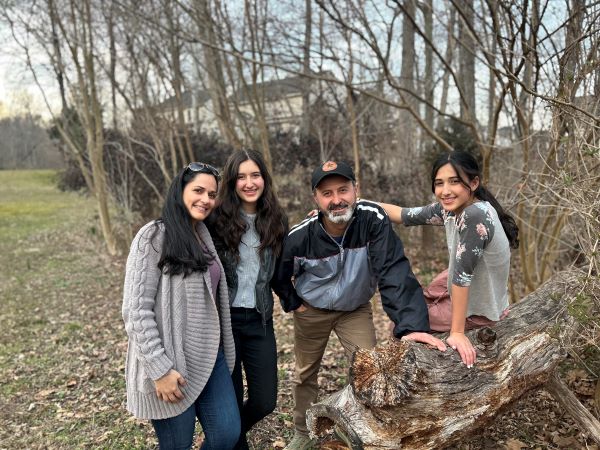Tips for Veterans to Manage Sensory Overload and Triggers

People often celebrate major celebrations like the Fourth of July or New Year’s Eve with fireworks. While these can mark festive occasions, they can also be triggering for some military personnel.
But these triggers are more than brightly colored explosions in the sky.
A trigger is a sensory reminder of a traumatic experience that can cause painful memories to resurface or evoke intense emotions or physical responses.
Triggers vary by person, but common triggers may include:
- People
- Places
- Objects
- Sounds
- Smells
- Weather
- Times of year
“Anyone can have adverse reactions based on their memories of personal experiences,” said Jacob Norotsky, an Army veteran, noting there are still things that affect him even though it's been years since he left the military.
Fireworks, for instance, don’t bother Jake now, but that wasn’t always the case. He recalls a week after coming home from deployment, visiting an amusement park. "I wasn't expecting [fireworks] ...when the first one exploded, I hit the deck." He'd reacted as he'd been trained to do when an unexpected explosion went off. "It took me a few years to become comfortable, even when I knew they were coming."
Jake credits Wounded Warrior Project® (WWP) with helping him learn more about post-traumatic stress disorder (PTSD) and giving him tools to heal.
"The Army took years to train me to be combat aware. Wounded Warrior Project taught me to be self-aware and self-regulate in moments where my feelings are amplified," he says.
With that education, Jake learned how to live with PTSD, not around it. Today, he holds season tickets to Auburn University football games, enjoying the energy and camaraderie with friends and family, as well as regular fireworks displays. "I know when they are coming, where they are coming from."
He is also a member of the WWP™ Warriors Speak team, sharing his experiences and advice with others.
Check Yourself and Be Honest with Others
"I still have moments and memories. But I am more aware now," said Jake, noting that he checks in with himself before a potentially stressful activity. “If you feel off, you can opt out or make adjustments to avoid any issues."

Crowds and loud noises are often triggering to veterans.
He recalls that after a rather emotional presentation, he opted to skip attending a football game with friends. "I was not at 100%. I was exhausted. I decided not to put myself in a position where I might be triggered by something."
He adds that while it may be uncomfortable, being honest with family or friends is important.
"Educating others about PTSD helps to normalize the condition. Also, if you are ever in a situation unexpectedly, your friends or family will know how to help you."
Be Flexible and Adjust Your Schedule
Marine Corps veteran Nelson Lorenzo, who now works as a WWP Talk program manager, often reminds others that sometimes, a change of scenery can help quell the effects of a trigger.
Nelson recalls being at a theme park with his family when he saw a large group enter an attraction they planned to visit. He suddenly felt uneasy and tense. “The thoughts crossing my mind, all the scenarios, concerns for my family’s safety, my anxiety rapidly increased.”
To help alleviate his stress, Nelson suggested they return later in the day when it would be less crowded.
Make Intentional Choices
Bill Geiger knows that triggers – and the intensity of his reaction to them – may change based on the environment or setting.
“While there is always a chance that something might be triggering, it might not be every time,” said Bill. “Something that triggers a feeling or response today might not have been triggering for me last month.”
Bill will try to remove himself from a situation if he feels stressed, but to limit potential reactions, he is more intentional and mindful when making plans.
“I didn’t go to concerts for over a decade. I still don't frequent them often, but now, if my wife and I go, we will strategically pick seats and get there early to find our seats and get situated before the large crowds show up,” he said.
Offer an Alternative

Taniki enjoys the outdoors with her family.
Veteran Taniki Richard values spending quality time with her family, so a few years ago, when her two sons asked her to play a video game with them, she happily accepted. “But they failed to consider the type of game they lovingly encouraged me to play,” she said.
“Very quickly, I discovered it triggered my post-traumatic stress responses. My palms were sweating, my heart rate elevated, and before I knew it, anxiety set in during what should have been good laughs and bonding time,” Taniki said.
“I had to tell them that mommy couldn’t play the game with them again because it wasn’t good for my mental health. They got sad, and I had to sit down with them and explain that in a family, sometimes, there are things that you need to do to support your mommy or daddy, and sometimes there are things they do to support you. Then we came up with other things to do together.”
Be Prepared and Pack Accordingly
Burning trash or oil, diesel fuel, and other acrid smells can be common triggers for warriors. For Beth King, a former Army soldier, driving certain roads when she lived in Texas was a significant challenge. “I found it hard to stay present when a certain smell was there. I would start to obsess when memories started to ruminate in my head,” said Beth, who tried everything from gum to essential oils to calm her olfactory nerves.
“Keep trying things until you find what works. Now I carry a scented inhaler that I found is strong enough to push the smells out. It’s in my bag, in my car. I always have it,” she said.
Create a Network of Support
Veteran David Daly admits that not a day goes by when PTSD doesn’t affect his life. After four tours in Iraq and one in Afghanistan, some things are deeply embedded in his memory.
To help lessen the impacts, he often reaches out to others. “It’s important to have a network of support you can check with. I have a couple of trusted people I can call or text, and they can talk me down,” he said.
But regardless of what triggers you, he reminds others to be kind to themselves.
“Understand that the trigger is happening for a real reason, even if you never went to war. Take a second to understand it is alright to feel the way you are,” he said.
Learn more about how WWP can support you in managing PTSD triggers and symptoms.
Family Members Can Get Triggered, TooDiscussing PTSD or other mental health issues has often been stigmatized, but openly addressing challenges fosters healing and growth, explained Omy Emami, an Air Force veteran who became the primary caregiver for her husband, Nima, after he was medically retired. A former mental health counselor, Omy thought she was well-prepared to help her husband while managing her own needs. “After years of working with clients, hearing their stories, and walking with them through their pain, I was surprised when one day, while helping my husband, I suddenly noticed symptoms of my own begin to surface,” said Omy. 
Omy (left), with her two daughters and husband Nima. “Initially, I found myself becoming restless, hyper-vigilant, and paranoid. But eventually, depression took over, and it was so overwhelming that it paralyzed me to the point where I could no longer function or get out of bed.” Secondary trauma symptoms are common among caregivers and loved ones of warriors. As a mother of two young girls, Omy realized she needed help to ensure the vitality of her family. “Taking that first step is hard, but recognizing how your loved one’s journey affects you and your family – and what assistance is available – can only help to ensure you all have a better quality of life going forward.” Read more about WWP’s resources and programs for supporting mental health and wellness. |
Contact: Cynthia Weiss – Public Relations, cweiss@woundedwarriorproject.org, 904.738.2589
About Wounded Warrior Project
Wounded Warrior Project is our nation’s leading veteran services organization, focused on the total well-being of post-9/11 wounded, ill, or injured veterans. Our programs, advocacy, and awareness efforts help warriors thrive, provide essential lifelines to families and caregivers, and prevent veteran suicides. Learn more about Wounded Warrior Project.


